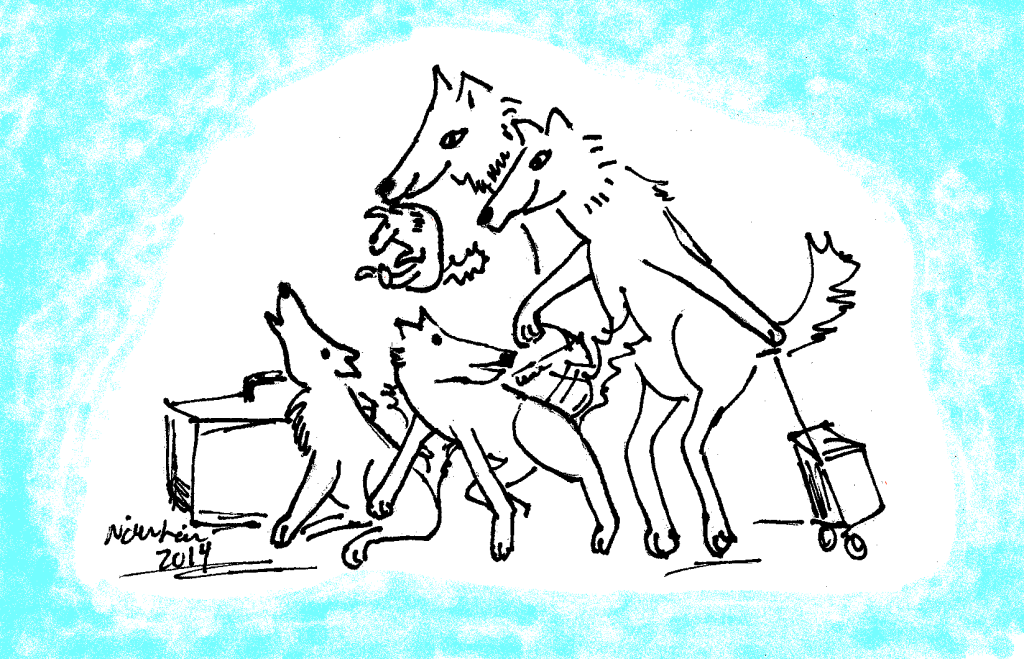Traveling with Young Children

In spite of long TSA lines, rental car challenges and all the howling, the wolf family went to grandmother’s house every year for the holidays.
You don’t appreciate how much your baby has grown until you attempt a diaper change on a plane. For families with young children, any holiday can become stressful when travel is involved. Often families travel great distances to be together and attend parties that run later than children’s usual bedtime. Fancy food and fancy dress are common. Well-meaning relatives who see your children once a year can be too quick to hug and kiss, sending even not-so-shy kids running. Here are some tips for safer and smoother holiday travel:
If you are flying:
- Do not offer Benadryl (diphenhydramine) as a way of “insuring” sleep during a flight. Kids can have paradoxical reactions and become hyper instead of sleepy, and even if they do become sleepy, the added stimulation of flying can combine to produce an ornery, sleepy, tantrum-prone kid. Usually the drone of the plane is enough to sooth kids into a slumber.
- Not all kids develop ear pain on planes as they descend- some sleep right through landing. However, if needed you can offer pacifiers, bottles, drinks, or healthy snacks during take-off and landing because swallowing may help prevent pressure buildup and thus discomfort in the ears. And yes, it is okay to fly with an ear infection.
General tips for visiting:
- Traveling 400 miles away from home to spend a few days with close family and/or friends is not the time to solve your child’s chronic problems. Let’s say you have a child who is a poor sleeper and tries to climb into your bed every night at home. Knowing that even the best of sleepers often have difficulty sleeping in a new environment, just take your “bad sleeper” into your bed at bedtime and avoid your usual home routine of waking up every hour to walk her back into her room. Similarly, if you have a picky eater, pack her favorite portable meal as a backup for fancy dinners. One exception is when you are trying to say bye-bye to the binkie or pacifier.
- Supervise your child’s eating and do not allow your child to overeat while you catch up with a distant relative or friend. Ginger-bread house vomit is DISGUSTING, as Dr. Kardos found out first-hand when one of her children ate too much of the beautiful and very generously-sized ginger bread house for dessert.
- Speaking of food, a good idea is to give your children a wholesome, healthy meal at home, or at your “home base,” before going to a holiday party that will be filled with food that will be foreign to your children. Hunger fuels tantrums so make sure his appetite needs are met. Then, you also won’t feel guilty letting him eat sweets at a party because he already ate healthy foods earlier in the day.
- If you have a young baby, be careful not to put yourself in a situation where you lose control of your ability to protect the baby from germs. Well-meaning family members love passing infants from person to person, smothering them with kisses along the way. Unfortunately, nose-to-nose kisses may spread cold and flu viruses along with holiday cheer.
- On the flip side, there are some family events, such as having your 95-year-old great-grandfather meet your baby for the first time, that are once-in-a-lifetime. So while you should be cautious on behalf of your child, ultimately, heed your heart. At six weeks old, Dr. Lai’s baby traveled several hours to see her grandfather in a hospital after he had a heart attack. Dr. Lai likes to think it made her father in law’s recovery go more smoothly.
- If you have a shy child, try to arrive early to the family gathering. This avoids the situation of walking into a house full of unfamiliar relatives or friends who can overwhelm him with their enthusiasm. Together, you and your shy child can explore the house, locate the toys, find the bathrooms, and become familiar with the party hosts. Then your child can become a greeter, or can simply play alone first before you introduce him to guests as they arrive. If possible, spend time in the days before the gathering sharing family photos and stories to familiarize your child with relatives or friends he may not see often.
- Sometimes you have to remember that once you have children, their needs come before yours. Although you eagerly anticipated a holiday reunion, your child may be too young to appreciate it for more than a couple of hours . An ill, overtired child makes everyone miserable. If your child has an illness, is tired, won’t use the unfamiliar bathroom, has eaten too many cookies and has a belly ache, or is in general crying, clingy, and miserable, despite your best efforts, just leave the party. You can console yourself that when your child is older his actions at that gathering will be the impetus for family legends, or at least will make for a funny story.
- Enjoy your CHILD’s perspective of holidays: enjoy his pride in learning new customs, his enthusiasm for opening gifts, his joy in playing with cousins he seldom sees, his excitement in reading holiday books, and his happiness as he spends extra time with you, his parents.
We wish you all the best this new year!
Julie Kardos, MD and Naline Lai, MD
©2014, 2015 Two Peds in a Pod®
Updated from our 2009 articles on these topics